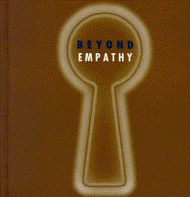Robert Elliott, Ph.D., Arthur C. Bohart, Ph.D.,
Jeanne C. Watson, Ph.D., & Leslie S. Greenberg, Ph.D.
Definition. Carl Rogers (1980, p. 85) defined empathy as: “the therapist’s sensitive ability and willingness to understand the client’s thoughts, feelings and struggles from the client’s point of view. [It is] this ability to see completely through the client’s eyes, to adopt his frame of reference....It means entering the private perceptual world of the other...being sensitive, moment by moment, to the changing felt meanings which flow in this other person....It means sensing meanings of which he or she is scarcely aware” (p. 142).
Clinical Example. “Mark” is a 30-year-old man who came to psychotherapy complaining of pervasive anxiety. Five minutes into the first session, the following took place:
Client:I’m really in a panic (anxious, looking plaintively at the therapist). I feel anxious all the time. Sometimes it seems so bad I really worry that I’m completely falling apart. Nothing like this has ever happened to me before.
Therapist:So a real sense of vulnerability—kind of like, you don’t even know yourself anymore.
Client:Yes! That’s it. I don’t know myself anymore. I feel totally lost, like a big cloud that just takes me over, and I can’t even find myself in it anymore. I don’t even know what I want, what I trust….I’m lost.
Therapist:Totally lost, like, “Where did Mark go? I can’t find myself anymore.”
Client:No, I can’t (sadly, and thoughtfully).
Meta-Analytic Review.We searched carefully for all English-language studies using a measure of therapist empathy to predict treatment outcome. We found 59 different samples of clients (from 57 studies), representing 3,599 clients and 224 separate effects.
Our meta-analysis resulted in an overall effect size of .30, a medium effect, between therapist empathy and client success. This effect size is about the same size as, or slightly larger than, previous analyses of the relationship between the alliance in individual therapy and treatment outcome.
However, there was statistically significant, nonrandom variability across the effects (Cochrane’s Q = 205.8,p< .001), meaning that the empathy-outcome relation is not consistent and is affected by other factors. To investigate these sources of variability, we looked at a range of possible moderators. We found that empathy predicted treatment outcome consistently across different theoretical orientations (e.g., CBT, humanistic), treatment formats (individua l, group), and levels of client problem severity. It was strongest for client- and observer-rated empathy. Empathy also appeared to predict outcome better for less experienced therapists. 14
Therapeutic Practices
♦ It is important for psychotherapists to make efforts to understand their clients’ experiences and to demonstrate this understanding through responses that address the client needs as the client perceives them.
♦ Empathic therapists do not parrot clients’ words back or reflect only the content of those words; instead, they understand overall goals and moment-to-moment experiences.
♦ Empathic responses can take many forms, including straightforward responses that convey understanding of client experience, but also responses that validate the client’s perspective, that try to bring the client’s experience to life using evocative language, or that aim at what is implicit but not yet expressed in words.
♦ Therapists should neither assume that they are mind readers nor that their experience of understanding the client will be matched by clients feeling understood.
♦ Finally, because research has shown empathy to be inseparable from the other relational conditions, therapists should seek to offer empathy in a context of authentic caring for the client.
References
Bohart, A. C., & Greenberg, L. S. (Eds.). (1997).Empathy reconsidered: New directions in psychotherapy. Washington, DC: American Psychological Association.
Elliott, R., Bohart, A.C., Watson, J. C., & Greenberg, L. S. (2011). Empathy. In J. C. Norcross (Ed.),Psychotherapy relationships that work(2nd ed.). New York: Oxford University Press. Rogers, C. R. (1980). A way of being. Boston: Houghton Mifflin.

